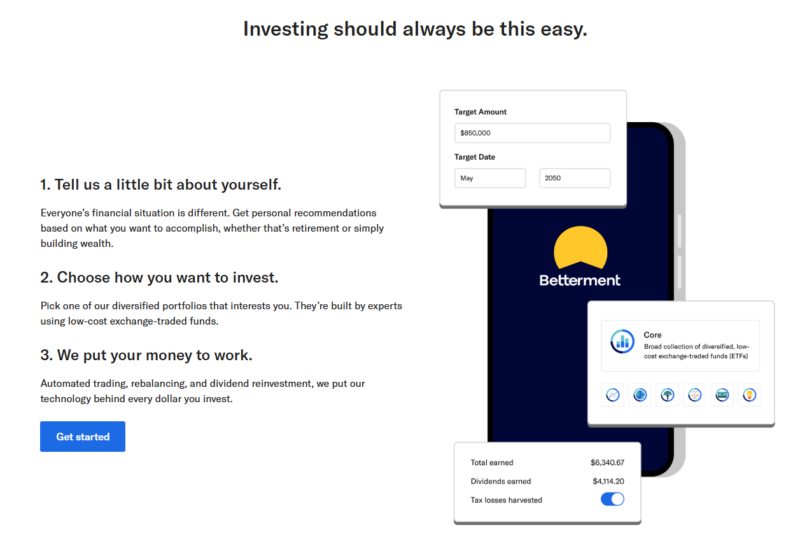Betterment Review: Is It Worth It?


Product Name: Betterment
Product Description: Betterment is one of the oldest roboadvisors with reasonable fees, expert portfolios, and a cash management account with high yields.
Summary
Betterment is a robo advisor that offers ten premade portfolios. These portfolios will automatically rebalance making investing a truly hands-off experience. It costs $4 a month for balances under $20,000. For balances above $20,000 the fee is 0.25%.
Pros
Cons
Betterment is a longstanding robo-advisor offering low fees and more control over your portfolio than many automated investment platforms.
Betterment offers expert-built portfolios, including socially responsible and crypto portfolios, a high-yield cash account, a no-fee checking account, and access to human advisors.
But with so many robo-advisors to choose from, is Betterment still worth it?
Betterment is perfect for beginner investors or anyone who wants hands-off investing. It has much lower fees than working with a human advisor, plus a variety of premade portfolios that are automatically rebalanced over time. It also has some tax efficiencies you can opt into if you have taxable accounts.
Betterment is an online, automated investment platform, a.k.a. a robo-advisor.
With over $50 billion in assets under management, Betterment is one of the largest independent robo-advisors on the market today. In fact, Betterment was the first independent online financial advisor to reach $10 billion in AUM in July of 2017.
With Betterment, your entire investment experience takes place online. An algorithm calculates your portfolio based on your preferences and goals.

Since everything runs through computers, they can offer investment management at a very low cost. This makes it cost-effective for any investor, regardless of investment size. Most financial advisors won’t even talk to you if you have less than half a million in assets, but you can invest with Betterment for as little as $1.
If you’re new to investing or you don’t have much money, Betterment may be the best solution to your investment needs. If you are a larger or more experienced investor, Betterment may be a good platform to have some of your portfolios professionally managed.
Betterment will provide automated account management for a very low annual fee. That will include creating and rebalancing your portfolio, reinvesting dividends, and implementing tax efficiencies to minimize the tax liability your account will generate.
Betterment uses Modern Portfolio Theory, which favors general asset allocation over individual security selection.
Your portfolio will consist of exchange-traded funds(ETFs), comprising U.S. and foreign stocks and bonds in your asset allocation.
ETFs are low-cost, index-based funds designed to match an underlying index’s performance, like the S&P 500 Index. This is what’s known as passive investing because neither Betterment nor the funds themselves actively trade securities within the funds.
Betterment has built automated tax-efficient strategies into its portfolios to help you lower your taxes. Betterment supports tax loss harvesting, which involves offsetting capital gains and income by selling a security that has experienced a loss. Betterment’s Tax Loss Harvesting+ feature is fully automated and is available to investors at no additional cost.
Betterment also offers tax coordination, which automates a complex strategy known as asset location for your retirement goals. Asset location can improve your after-tax returns without increasing your portfolio’s risk level.
You can open the following account types with Betterment:
Betterment has ten prebuilt portfolios to choose from, plus a cash reserve fund. Here is a breakdown of some of these portfolios as of December 2024.
This portfolio is for those who want optimized exposure to stocks and bonds. It has had annualized returns of 9.5% since 2011 and has an allocation of 90% stocks and 10% bonds.
Top holdings include:
This portfolio focuses on value investing and looking for undervalued companies worldwide. It has an annualized return of 9.4% since 2011 and an allocation of 90% stocks and 10% bonds.
Top holdings include:
This portfolio is for investors who want to invest in a socially responsible way. It has annualized returns of 7.9% since 2017 and has an allocation of 90% stocks and 10% bonds.
Top holdings include:
This portfolio invests based on trends and is for investors seeking greater growth potential. It has an annualized return of 9.0% since 2017 and has an allocation of 90% stocks and 10% bonds.
Top holdings include:
This portfolio is for those who are looking for a high after-tax yield. This portfolio began in June of 2024, but so far has annualized returns of 4.7% and has an allocation of 100% bonds.
Top holdings include:
This portfolio is for those who want a low-risk investment to hold their cash but also potentially earn returns. It has had annualized returns of 1.8% since 2017 and has an allocation of 100% bonds.
Top holdings include:
This portfolio is for investors who want exposure to cryptocurrency. Annualized returns are not provided.
Top holdings include:
Betterment will rebalance your portfolio as needed as funds change in value.
In addition to the portfolios listed above, Betterment offers additional portfolios. Here’s a brief description of those portfolios.
Betterment invests in “pioneer companies” through its Innovative Technology portfolio. The companies in this portfolio are involved with clean energy, semiconductors, robots, virtual reality, blockchain, and nanotechnology.
The portfolio mix is 90% stocks and 10% bonds.
This portfolio invests in companies funding green projects and lower carbon emissions, as well as those that divest from fossil fuel reserves. It is another SRI portfolio. Like Broad Impact, it includes a few bond funds from the Core portfolio but holds stocks in the funds that favor low carbon emissions. It has an allocation of 90% stocks and 10% bonds.
Another SRI portfolio, but one that emphasizes companies supporting social equality and minority empowerment. It adds funds with these specializations alongside bond positions. It has an allocation of 90% stocks and 10% bonds.
Betterment offers a high-yield cash account currently paying a variable rate of 4.00% APY. That makes it a nice option for you to hold cash balances on the same platform where you invest your money. You can open an account with as little as $10, and there are no monthly maintenance fees. Meanwhile, the account features unlimited withdrawals.
(Annual percentage yield (variable) is as of 12/30/2024. Cash Reserve is only available to clients of Betterment LLC, which is not a bank, and cash transfers to program banks are conducted through the clients’ brokerage accounts at Betterment Securities.)
Because multiple banking partners provide the Cash Reserve, FDIC insurance applies on balances up to $2 million. That’s eight times higher than the $250,000 in coverage offered by your friendly neighborhood bank. If you open a joint account, the FDIC coverage will rise to $4 million.
This is a mobile checking account that comes with a Visa debit card. There are no monthly or overdraft fees. Meanwhile, Betterment reimburses you for ATM fees and foreign transaction fees. The account even comes with paper checks, which is fairly unusual with online banks. And when you make purchases using your debit card, you can earn cash back rewards from thousands of your favorite brands.
Here’s how Betterment’s pricing breaks down:
Investing: $4 monthly fee or 0.25% annual fee. You’ll start out with a flat fee of $4 per month, but you’ll automatically switch to 0.25% when you either a) set up recurring deposits of $250 or more or b) reach an account balance of $20,000 or more across all accounts held with Betterment. That includes the checking, Cash Reserve, Crypto portfolios, and your Core portfolio.
Crypto Investing: 1% annual fee + trading expenses
High-Yield Cash Reserve Account: No fee
Checking Account: No fee
Betterment Premium: A 0.15% add-on fee applies to Investing and Crypto investing fees but does not apply to Cash Reserve. Betterment Premium gives you unlimited access to financial planning advice from a Betterment CFP. There is a $100k minimum balance requirement for this service.
In addition to the investing plan, Betterment offers a Premium plan. You’ll need a minimum portfolio balance of $100,000, and you’ll have access to unlimited financial guidance from a certified financial planner. That planner will help you with everything from retirement to crypto investing. It includes professional one-on-one advice to help you establish your goals and create a roadmap to reach them.
The portfolio minimum balance includes investment and crypto accounts, whether taxable or retirement. It does not include cash accounts, HSAs, or an employer 401(k) account managed by Betterment.
Related: Betterment Checking and Savings Review: Cash Reserve
Betterment is available to U.S. citizens 18 years old or older with a permanent U.S. address, a U.S. Social Security number or ITIN, and a checking account from a U.S. bank. Residents of Puerto Rico and the Virgin Islands (but not Guam) and U.S. military personnel residing abroad are also eligible.
You can open a Betterment account and start investing in a couple of steps:
Note: You can open an account with no money and then begin investing as you fund it. For that reason, you’ll need to connect a bank account to your Betterment account. But you can also set up direct deposits from your paycheck for funding purposes.
If you’re looking for a robo-advisor platform that supports your passive investing strategy, you may want to explore the following options before you sign up with Betterment.
Wealthfront may be Betterment’s biggest competitor. Both companies launched around the same time, and they’ve closely paralleled one another since. Like Betterment, Wealthfront provides you with a diversified portfolio of stocks and bonds.
However, Wealthfront offers a broader diversification, spreading your portfolio among 239 investments in 17 different asset classes. That includes sectors like cryptocurrency trusts, commodity funds, and funds that specialize in technology. They also offer a flat fee pricing of 0.25% on all account balances. And like Betterment, Wealthfront also offers a high-yield Cash account, with a slightly higher APY (5.00% vs. 4.75%) as of February 2024.
Here’s our full Wealthfront review for more information.
If you like the robo-advisor concept but want more control over your investment, M1 Finance is an excellent alternative to Betterment. With M1 Finance, you can choose the stocks and ETFs that you hold in your M1 Finance portfolios (called “pies”) and have M1 Finance manage and rebalance them automatically.
There is a $3 monthly fee for the robo advisor. However, the fee is waived if you have an active loan and an investment balance of at least $10,000.
Here’s our full M1 Finance review for more information.
SoFi Invest® is a robo-advisor that is similar to Betterment. It uses a goals-based system that allows you to invest for both short-term needs, like saving for the down payment on a home, or long-term goals, like retirement.
Sofi charges a flat 0.25% for automated investing. Plus, it has a self-directed option, which Betterment doesn’t. You can invest on your own through SoFi Active Investing, with no commission fees, when you buy and sell individual stocks and funds. Like Betterment, SoFi offers a high-yield savings account. It doesn’t have a cash reserve account, but it does offer a high-yield savings account.
Here’s our full Sofi Invest review for more information.
At its core, Betterment is a robo-advisor. And until a few years ago, that was basically all it was. But Betterment has been steadily expanding its product offering and now provides a variety of portfolio options, including banking services and financial planning.
Probably the biggest knock against Betterment is that it doesn’t have a self-directed investing option. It’s designed specifically for investors looking for low-cost, professional investment management. In that regard, it’s a perfect hands-off investment service, enabling you to save money for investing without actually needing to get involved in the process.
Betterment is a trustworthy investment platform. First, accounts held with the company are covered under SIPC insurance, which provides protection against broker failure for up to $500,000 in cash and securities, including up to $250,000 in cash. Second, it’s a fiduciary company that’s registered with the Securities and Exchange Commission (SEC) and is also a registered member of FINRA.
Yes. Most Betterment investors will pay a $4 monthly fee (for balances up to $20,000) or 0.25% annually on assets under management. While it’s not the lowest-priced robo-advisor on the market, it is much more affordable than dealing with a human advisor.
If you’re looking for a robo-advisor and don’t need to be hands-on with investment decisions, Betterment is a solid choice. It’s ideal for beginner investors or anyone who follows a passive investing approach. We also like the automated tax-efficient strategies that Betterment employs, the fact that clients with larger portfolios can access financial planning advice, and the High-Yield Cash Reserve account.
That said, if you’re looking for the lowest possible price and more portfolio customization, M1 Finance might be a better choice. And if you’re a self-directed investor, you’ll want to deal with a discount brokerage that will allow you to select your own investments and place your own trades.

High-net-worth clients and advisors are both facing the same challenge: how to better connect with the next generation. In fact,...

When voters think of student loan forgiveness, they often picture executive actions and legal battles. Under President Biden, student loan...

Eight years ago, I learned about the Holy Grail of Sports on a snow-covered hill in South Korea. Just above...